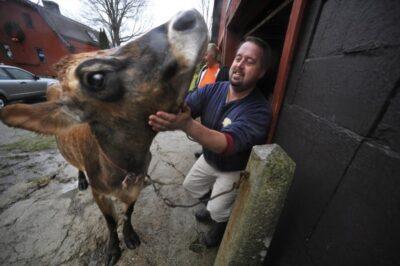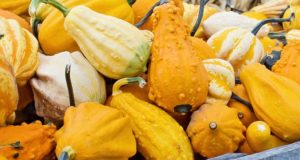Maine’s Supreme Court is scheduled to hear a case next week involving raw milk that could give important new legal rights to farmers and homesteaders.
The court will decide if local governments can exempt farmers from state regulations under “food sovereignty ordinances.”
Farmer Dan Brown of Blue Hill, Maine, was fined $1,000 for selling raw milk without a license, selling unlabeled raw milk and operating a retail food establishment at his Gravelwood Farm. Brown was forced to file for bankruptcy after a court placed an injunction prohibiting him from selling dairy products last year.
The fact that the court is hearing the case at all means it “believes the issues involved are very significant,” said Attorney Gary Cox, general counsel for the Farm to Consumer Legal Defense Fund, which is representing Brown.
The farmer contends he is exempt from state law because the town he lives in, Blue Hill, passed a food sovereignty ordinance in 2010. Such an ordinance is designed to exempt farmers and others from state laws regulating food.
Lower Court Ruled Against Brown
Last year Hancock County Judge Ann Murray ruled that state inspectors had the right to fine Brown despite the ordinance. Blue Hill’s Local Food and Community Self-Governance Ordinance “clearly frustrate[s] the purpose of the state law,” Murray wrote.
Everything you need to know to keep a cow healthy, happy, and productive…
Cox has asked the Supreme Court to rule on two issues:
- Is it legal for local communities to exempt themselves from state food regulations?
- Did the state of Maine act properly when it changed the Food and Dairy code to require farmers that sell raw unpasteurized milk to get a Milk Distributor Permit in 2009? Before then, farmers were allowed to sell raw milk as long as they did not advertise. Cox contends that the state’s Department of Agriculture, Conservation and Forestry did not have the legal power to make that change without an act of the state legislature.
Cox and his colleague Sandra Collier are scheduled to present oral arguments in Brown’s case in Portland, Maine, on May 13. Arguments are scheduled to be streamed live online.
Double Standard?
Brown’s case is an unusual one because another farmer in his area has been granted a Milk Distributor’s Permit to sell raw milk, The Weekly Packet newspaper reported.
Story continues below video
The state gave Deborah Evans and Laura Livingston, the operators of Bagaduce Farm in Brooksville, Maine, such a permit. Ironically enough, the permit was granted on the same day that Brown filed for bankruptcy, May 22, 2013.
“She is licensed to sell,” state inspector Renee Blais said of Deborah Evans.
“The fact that we ended up qualifying for a license was a huge shock,” Evans said. The farmer told The Packet that she thought her farm didn’t have the equipment necessary to meet state standards. Those requirements include stainless steel sinks, a concrete milking platform, running hot water and self-sealing doors.
Evans paid the state $25 for the license and agreed to allow inspectors to regularly test her milk.
“They felt that what we were doing and the way we were milking—directly into a strainer on top of a sanitized jar—met performance requirements of what they thought was appropriate for our scale,” Evans said. Evans only has one cow; Brown apparently has several cows.
Brown claims that state inspectors gave him a long list of requirements. He also claims to have tried to comply with state laws but was unable to do so. The farmer alleges that state inspectors refused to cooperate with him.
The Maine Supreme Court isn’t the only high court that could rule on the raw milk issue. As Off The Grid News reported, Ontario farmer Michael Schmidt has appealed his conviction for selling raw milk to Canada’s Supreme Court.
Sign up for Off The Grid News’ weekly email and stay informed about the issues important to you
 Off The Grid News Better Ideas For Off The Grid Living
Off The Grid News Better Ideas For Off The Grid Living





